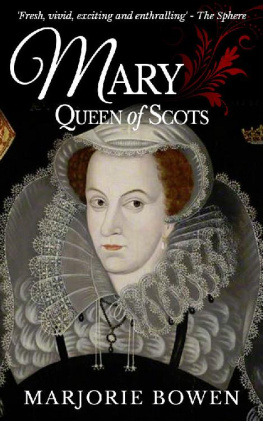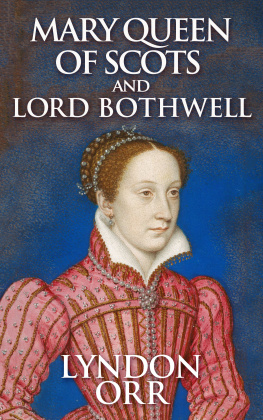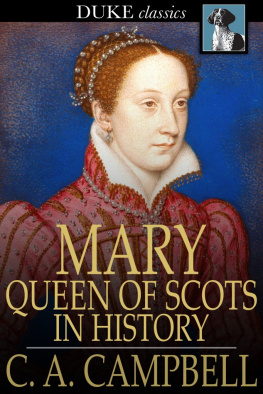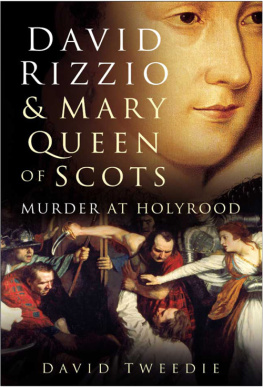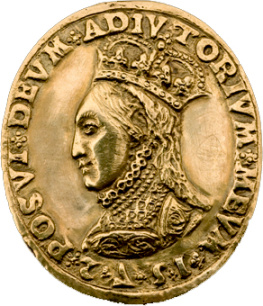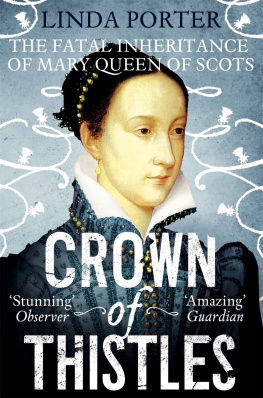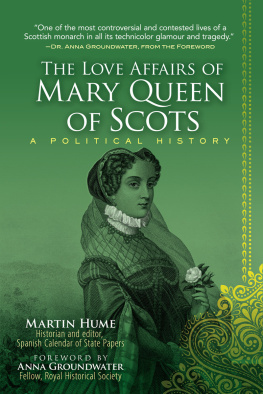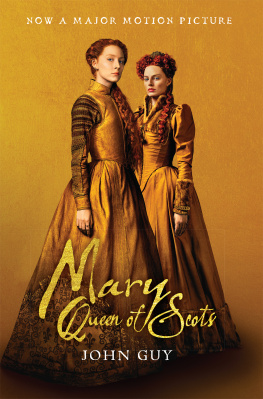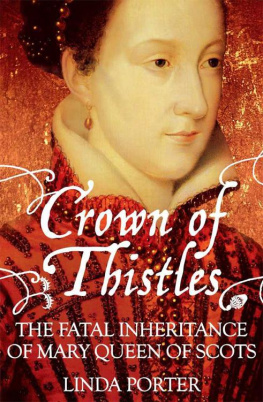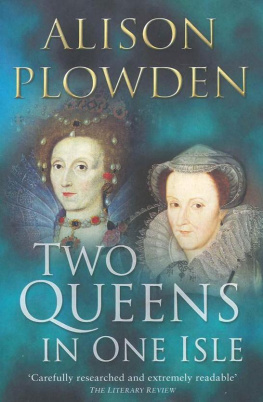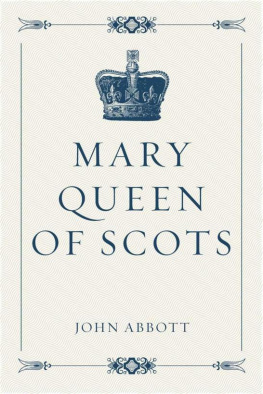Mary Queen of Scots
Marjorie Bowen
Marjorie Bowen, 1934
Marjorie Bowen has asserted her rights under the Copyright, Design and Patents Act, 1988, to be identified as the author of this work.
First published in 1934 by The Bodley Head Ltd.
This edition published in 2015 by Endeavour Press Ltd.
Table of Contents
Foreword
THE writers who select the first Mary Stewart as their subject usually seem impelled to offer some apology for dealing yet once more with a figure so familiar to readers of history, fiction, and legend.
It may, however, be reasonably argued that the story of this beautiful and unfortunate woman has become one of the immortal stories of the world, which will continue for many centuries yet to inspire historians, romantics, and poets to a re-telling, and attract many thousands of readers into a re-reading.
This tale can no more be staled by repetition than that of the Siege of Troy. It has become part of the common material of every writer, as the visit of the Three Kings, the departure of Adonis on his fatal hunt, and the rescue of Andromeda by Perseus were subjects enjoyed in common by all the painters of the Renaissance, and reproduced in numberless variations ranging from masterpieces of the highest inspirational merit to the hack work of copyists.
It is not likely that the most diligent of historians will ever discover further vital information relating to the history of Mary Queen of Scots. The most laborious researches have been made into every detail of her career and into the careers of those most intimately associated with her, and it would appear that the final result has been, some while since, yielded.
Anyone interested in this poignant episode of our history may, without undue fatigue, study the contemporary documents on which all judgments must be founded and come to his own conclusions as to the right or wrong of the case. No historian, however well equipped in knowledge, penetration, and impartiality, can do more than offer his opinion of this subject which is so obscure and so mysterious. It is the historians profession to chronicle facts; if he be a scientific historian he may scarcely, even, draw deductions from them, and his accurate volume will contain nothing but those carefully sifted collections of these same facts which, unrelated and often contradictory, appear to the lay reader to bear curiously little resemblance to a whole truth.
Yet, once the historian begins to sort and to arrange his facts, to endeavour to correlate them by the light of his own intuition and experience, too often by the light of his own emotions and prejudices, he must cease to be a historian and begin to invade the realms of poetry and fiction. Or, if he be not sober-minded but if he be partisan in spirit, the realms of polemic and special pleading.
So it seems that this business of writing of the past is attended by especial difficulties and that he who shall succeed at such a task must be especially gifted and especially fortunate, in his choice of a subject, in the manner of his approach, and in the final shape which he gives his work.
Kings and queens, heroines and heroes, those who used to be named the great and the famous, have for some time fallen out of favour in official history. The tendency has long been to deal more or less entirely with the histories of people, not those of their rulers or counsellors, with the cause and effect of those large movements which brought about those startling and dramatic climaxes which were formerly ascribed to individual character and effort.
Moved by something the same spirit modern biographers, discarding the one-time methods which displayed a personality in formal and stately fashion, stressing his virtues, glossing over his weaknesses, and giving considerable importance to all his public acts while glancing only with decorous reserve at the incidents of his private life, now go to the other extreme and, in selecting subjects for their books, merely choose butts for their wit. They delight to show their particular great man not only as not a hero to his valet but as not a hero to anyone else.
This attitude has in it, obviously, much of essential truth. No human being can be definitely a hero or a heroine on every occasion and in every circumstance. But, an insistence on this fact, which might, with a little humour; be taken for granted, distorts the picture which the author is creating in his feverish search for the exact and humiliating truth.
It is doubtful whether this method of caustic, mocking biography is really much relished by most of us. We may, for a while, be amused to learn that the man whom we have seen always taught to regard as more than life-size was, in many important aspects, a veritable pigmy, but our mirth is inclined to be dry and hollow. We are all of us vicariously humiliated in the degradation of the hero who must, in order to have attained the position from which his last biographer has carefully dragged him, have at one time or another represented a national idea or some achievement admired by all humanity, and who has therefore been the object of the secret emulation and applause of all of us.
The game has also proved too easy to be long popular the amateur and the hack have brought into disrepute a school of writing which was inaugurated by the brilliant talent of distinguished men of letters. There is already a reaction in favour of the heroic element in humanity. But, as both the stone figure on the pedestal clothed in official robes, and the tattered scarecrow who for a while took his place, seem out of fashion, how shall those of us who feel impelled to evoke some portion of the past, go about our task? Psycho-analysis, so much run after a few years ago, and containing as it does a great deal of essential truth, has been staled by abuse. Having lost its novelty it has become boring. Dissect any given soul as you will the vital elements of its composition are as likely to escape you as if you confined yourself to a merely surface treatment.
To admit the potency of these arguments is to leave oneself without defence. The truth, then, always escapes; it is no more to be discovered than the gold of El Dorado. We none of us even know the truth about ourselves: how then can we hope to know it about another human being, and about one who has been dead, perhaps several hundred years? Why should we write at all on a subject of which we must of necessity know so little? The answer can only lie largely in the perversity of human nature we desire to attempt the impossible. We hear from our earliest childhood of a certain subject or a certain character until we become fascinated, perhaps obsessed. Although reason tells us that everything is known and everything has been said on this matter, yet we long to re-arrange these familiar materials according to our own sense of design or of decoration, to make our own deductions from bare facts, to re-tell, by the light of our own experience, these experiences with which everyone is familiar. We think that perhaps there is something which has not yet been said and that we can say it. In brief, we wish to paint our own pictures of the familiar scene, to give these legendary creatures faces of our own fashioning, to draw our own design on their robes. We wish to present once again Venus and Adonis in a fresh glade with trees of our own choice overhead, and flowers of our own affections underfoot.
We long to write our own love stories, though people have been writing them since the world began, and most of them are likely to be better preserving than our own. It is a desire akin to the yearning to grow our own roses and lilies, though the most modest florists shop for a few shillings can sell us better than those which are the product of our utmost care.
It is in this spirit and with the utmost diffidence that the following study of Mary Queen of Scots has been written. There is little need for it and less excuse for it, but the author was impelled to write yet one more version of this ancient story. It does not claim the dignity of a history nor of an official biography, though a conscientious study of all the facts available to one who cannot indulge in original research work, has gone to the completing of this study.
Next page
